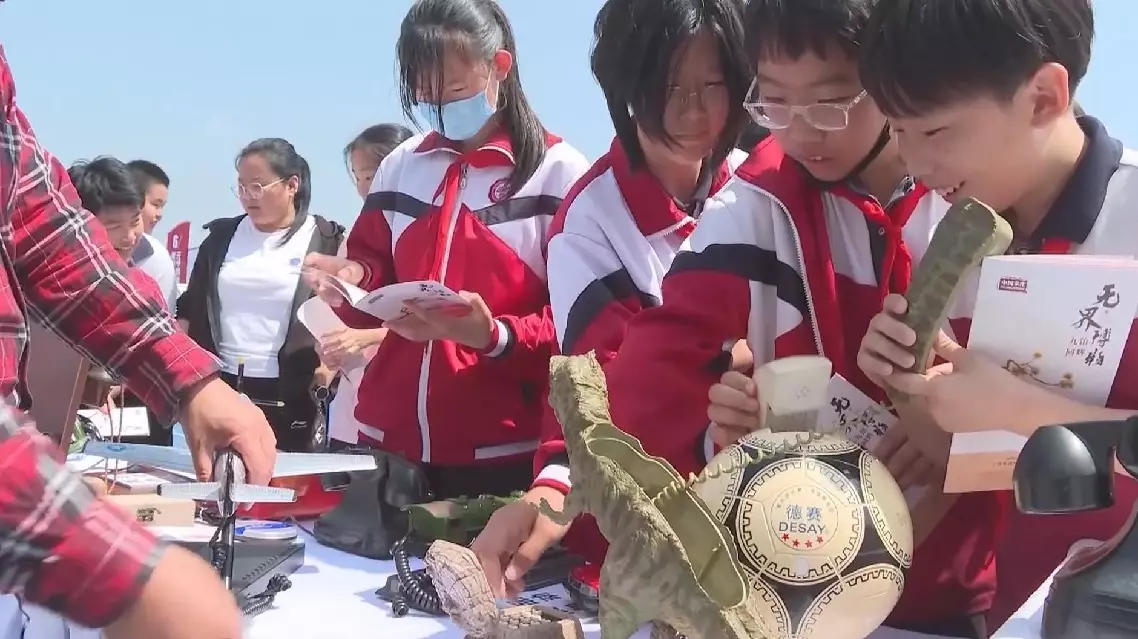Beijing's Songzhuang, an art zone in Tongzhou District, is marking the International Museum Day with a "museum without walls" cultural initiative.
In the days leading up to the International Museum Day, which falls on Sunday this year, Songzhuang has brought together nine of its most distinctive local museums, showcasing rare collections ranging from vintage film projectors and antique telephones to traditional enamel art.
Instead of staying behind gallery walls, these exhibits are traveling into local villages, schools, and neighborhoods throughout Tongzhou.
Aside from exhibitions, the "museum without walls" event also features hands-on cultural experiences, science workshops, and demonstrations of how to make intangible cultural heritage crafts.
"I think it's really great that all the museums are brought together in one place. Now we don't have to travel far to see so many unique and interesting things and can have a look at them all at once," said Ma Shuochen, a student at Songzhuang Central Primary School.
The activities aim to break down the traditional barriers between museums and the public, making arts and culture more accessible to people of all ages.

Beijing art district holds 'museum without walls' activities
The Iranian government is focusing on public concerns and maintaining stable supplies of essential goods amid recent protests, Iranian President Masoud Pezeshkian said in a televised interview on Sunday.
In the city of Karaj, northwest of the capital Tehran, daily life has largely continued as normal. A video filmed by a local resident on Sunday shows food stores open and grocery shelves fully stocked.
"This is the block near my home, and there are some food stores here. Daily life continues here. Last night we did not see many protests in Karaj. Right now the city is very safe. This is a grocery store close to my home. All the food is available; nothing is in shortage. Here are noodles and different types of beans. Here are dairy products, cheese, and yogurt. I also checked other grocery stores and didn't see any shortages. Everything is available," said local resident Ali Reza.
Iranian officials have described recent disturbances as acts orchestrated by the "enemy," including some carried out by well-trained and armed "terrorists." The incidents have caused casualties among security personnel and civilians, as well as property damage.
The Secretary of Iran's Supreme National Security Council Ali Larijani has directed authorities to severely punish the "terrorists."
Meanwhile, Iran's police chief Ahmad-Reza Radan said on Sunday that the police had raised alert levels and arrested several leaders of the troublemakers during the operations on Saturday.
President Pezeshkian noted in the interview that the normal demands of the Iranian people are reasonable and justified, but they must realize that triggering riots and carrying out terrorist acts are the enemy's attempts to undermine the country. He urged the public to remain vigilant.
Also on Sunday, Iranian Parliament Speaker Mohammad Baqer Qalibaf warned that Tehran would regard U.S. and Israeli bases and facilities in the Middle East as "legitimate targets" if Washington takes military action against Iran. His remarks followed media reports saying U.S. President Donald Trump is "seriously considering authorizing a strike" against Iran.
Iranian state media reported that at least 109 members of Iran's security forces have been killed in clashes since the protests began 14 days ago. Meanwhile, human rights groups based outside the country said the number of protesters killed has exceeded 200, though the figure could not be independently verified.
The protests initially erupted over a sharp depreciation of the rial and sweeping subsidy reforms. Iranian authorities have blamed the unrest on foreign-linked agents and sanctions imposed by the United States.

Iranian president says government focusing on ensuring supplies amid protests










